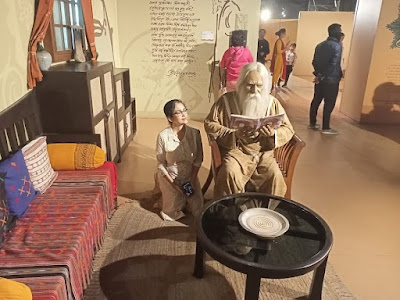Book Title: അർദ്ധനഗ്നർ (Arddhanagnar)
Author: Puzhankara Balanarayanan
Publisher: Current Books
കൃഷ്ണൻ നായർ ആദ്യവരിയെഴുതി: "മൈ ഡിയർ ലിസ്സ്" അത്രയും എഴുതിയപ്പോൾ മനസ്സ് സ്വസ്ഥമായി. തുടർന്നെഴുതി:
"ഒരുമിച്ചൊരു മുറിയിൽ കിടന്നുറങ്ങി പാതിരാത്രി കഴിഞ്ഞപ്പോൾ പെട്ടെന്നെഴുന്നേറ്റ് ഉറങ്ങിക്കിടക്കുന്ന പ്രിയതമയോട് മൗനമായി വിടപറഞ്ഞിറങ്ങിയ സിദ്ധാർത്ഥഗൗതമൻ്റെ കഥ നിനക്കറിയാമല്ലോ. പലപ്പോഴും നാമത് ചർച്ച ചെയ്തിട്ടുള്ളതുമാണ്. അങ്ങിനെയൊന്ന് സംഭവ്യമാണോ എന്ന് എത്രയോ പ്രാവശ്യം സംശയിച്ചതുമല്ലേ? എന്നാൽ അത് സംഭവ്യമാണെന്ന് ഞാൻ മനസ്സിലാക്കുന്നു. പെട്ടെന്ന്, തികച്ചും അപ്രതീക്ഷിതമായി ഞാൻ നിന്നോട് വിട പറയുന്നു. സിദ്ധാർത്ഥഗൗതമനും ഞാനും ഒരേ തരക്കാരല്ല. പക്ഷേ, ഒരു വലിയ അന്ത:ക്ഷോഭത്തിൽ ഞാൻ ചെന്നുപെട്ടു. വിടപറയാൻ നിർബ്ബന്ധിതനായി. നിൻ്റെ കത്തുകളിൽ പ്രകീർത്തിച്ച അർദ്ധനഗ്നനായ ഫക്കീറില്ലേ? ആ അർദ്ധ നഗ്നൻ എൻ്റെ മനസ്സിൽ കയറിവന്നുനിന്നു. അതുപോലൊരു അർദ്ധനഗ്നനാകണമെന്ന് എനിക്ക് ഉൽക്കടമായ ആഗ്രഹം. അത് സാദ്ധ്യമല്ല. പക്ഷേ, ഞാനിന്ന് അദ്ദേഹത്തിൻ്റെ
ആരാധകനും അനുയായിയുമാണ്."
Some books
make you wonder what took you so long in getting around to reading them.
Especially when they were lying so close within your reach that you could have just stretched
your hand out to pick them up. But you always thought they were downright
serious works and you wished to spare enough time to do full justice to them.
And
then one day you open one such book – Arddhanagnar (The Half-nakeds) by Puzhankara
Balanarayanan – and no sooner than you begin turning the pages, you find yourself getting wrapped up in them. You realize that the book is unputdownable. You sit up
late in the night reading it. And the first thing that you do in the morning
along with getting your cuppa is getting back to where you left off reading the previous
night. You don’t realize your coffee is turning cold. Indeed, you don’t even
realize you are not drinking it in the first place.
And then after the brisk, marathon poring-over and the nail-biting finish, you feel the satisfaction of a
good read and the contentment that you have, after all, done full justice to
the voluminous page-turner packed with a plot that has kept you on the edge of
your perch from beginning till end.
And to
those who have not read the book – no, this is not a suspense thriller. This is
fiction closely interwoven with the history of India during the times of the
Raj and the Freedom Struggle. The history is true and the fiction could as well
have been true. For, the story reflects the socio-political economic context of
those times. Travel back into the era, and you will meet up with different
versions of Velu Nair, Krishnan Nair, Sekharan, Madhavi Amma, Gouri, Elizabeth
Trevor, Kurup, etc. who lived similar lives in similar circumstances.
The novel is about native landowners discovering too late that they themselves were owned by the (British) Empire. It is about Indian aristocracy vying with the English aristocracy only to lose their own inherent charm and integrity. It is about the different circumstances that roused the sleeping Indian out of their prolonged stupor to break away from the shackles of serfdom, to be bound to the cause of freedom. It is about the desi turncoats stripping themselves of their garbs of delusion to don the nakedness of truth.
The
author, Puzhankara Balanarayanan, has interwoven fiction and history so
smoothly that there are no complicated, confusing knots, or loose, dangling
threads in the narration. While the story moves you, the historical anecdotes inspire
you even today – more than 7 decades and a half post independence. Take, for
instance, the author’s step-by-step detailing of the Salt March – you, the
reader, wait with bated breath as the "half-naked fakir" marches from station to station until
he reaches the final destination – Dandi. So what if you have always known the
culmination and the aftermath of the Movement anyway? Adding to the reading experience is the author's exceptional
expertise in building up climaxes and then taking you off on completely
unexpected tangents.
Today, days
after reading the book, this reader still remains caught in the web of the
author’s spellbinding and powerful narrative.
©


.jpg)






s.jpg)


